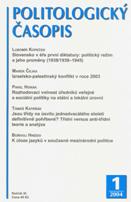K úloze jazyků v současné mezinárodní politice
The Role of Languages in Contemporary International Politics
Author(s): Bořivoj HnízdoSubject(s): Politics / Political Sciences
Published by: Masarykova univerzita nakladatelství
Keywords: language policy; globalization; nation-state; new regionalism; decentralization; integration; imperial languages
Summary/Abstract: Language is one of the most important elements of cultural identity, but also an expression of economic and political structures and relations. This article is mostly dealing with the role of languages in political processes on three levels: national, regional and international. Presently, all of them are changing together with the structure of contemporary international politics. However, the process of economic globalization does not mean the end of the traditional role of national languages in the process of nation-state building. Nation states are traditionally against policies of multilinguism and against political rights for minority languages. These processes are still quite visible, particularly in Asia. Nevertheless, globalization is also connected with new regionalism, on intrastate as well as international levels. The new role of languages on the regional level often reflects, especially in developed countries, processes of political decentralization. On the international level there is a special role for imperial languages. However, processes of integration in developed countries, particularly in Europe, in contradistinction to some other regions, are haunted by problems and limits because of language diversity and the lack of one unifying language.
Journal: Politologický časopis - Czech Journal of Political Science
- Issue Year: XI/2004
- Issue No: 1
- Page Range: 72-78
- Page Count: 6
- Language: Czech

